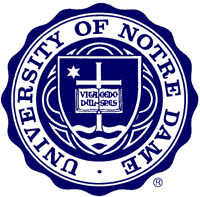
The University of Notre Dame has issued an institutional statement affirming its commitment to the defense of human life in all its stages. It also has adopted new principles for the institution’s charitable activity.
The formulation and adoption of the statement and principles were among recommendations made in January by the University’s Task Force on Supporting the Choice for Life to Notre Dame’s president, Rev. John I. Jenkins, C.S.C.
“I am grateful to the task force for recommending the creation of these documents and helping us compose them,” Father Jenkins said. “The statement articulates what always has been the case: that Notre Dame fully embraces Catholic teaching on the sanctity of life. The new principles provide standards for the University and its representatives in making determinations on giving in a way consonant with our beliefs.”
The charitable activity principles are not intended to apply to the personal giving of faculty, students and staff.
Notre Dame’s statement on the defense of life reads:
“Consistent with the teaching of the Catholic Church on such issues as abortion, research involving human embryos, euthanasia, the death penalty, and other related life issues, the University of Notre Dame recognizes and upholds the sanctity of human life from conception to natural death.”
Under the newly adopted principles on charitable activity, the University will seek to “direct its contributions to both persons and organizations so that they are not used to support research or activities that conflict with Catholic teachings. Should a question arise, Notre Dame will require written assurance that it can direct the use of its funds in ways that respect Catholic teachings. The University will monitor compliance. If ensuring appropriate use proves impossible or an organization consistently advocates research or other activities that conflict with fundamental Catholic moral principles, the University will withhold all further contributions.”
While the University will continue to encourage faculty and staff members “to contribute their time and resources to efforts to eradicate poverty, disease, and other social ills, both within our community and beyond,” the statement says, “these standards also govern authorized use of the University’s name to promote any charitable organization or activity, whether by the University itself or by officers and deans who publicly identify their University positions with their charitable commitments.”
The full text of the policy may be found online at http://president.nd.edu.
A document providing criteria for the implementation of charitable activity based upon the principles is forthcoming.
The Task Force on Supporting the Choice for Life was convened by Father Jenkins last September to consider and recommend ways in which the University can support the sanctity of life. The task force is co-chaired by Margaret Brinig, Fritz Duda Family Professor of Law, and John Cavadini, chair of the Department of Theology and McGrath-Cavadini Director of the Institute for Church Life. Its other members are Ann Astell, professor of theology; Kathleen Kelley, student; Mary Ellen Konieczny, assistant professor of sociology; Rev. William Lies, C.S.C., executive director of the Center for Social Concerns; and Rev. Mark Poorman, C.S.C., vice president for student affairs. Frances Shavers, chief of staff and special assistant to the president, and Todd Woodward, associate vice president for marketing communications, serve as task force liaisons.